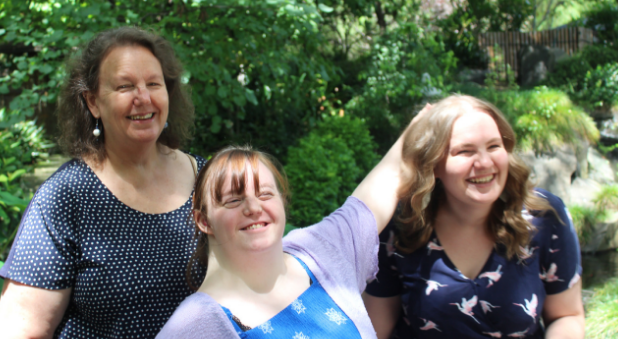At the recent Lausanne gathering in Manila, a book was launched that took me by surprise. Its title is Disability in Mission: The Church’s Hidden Treasure, edited by David C. Deuel and Nathan G. John.
Having a disability does not prevent you from serving Christ
Dr Nathan John is an Australian author whose real name has been suppressed for security reasons as he is part of a network of disability providers across India. Dr David Deuel serves as a Catalyst for Disability Concerns with the Lausanne Movement and is currently a senior research fellow for the Christian Institute on Disability, which is part of the Joni and Friends International Disability Centre based in California.
Many will know the name of Joni Eareckson (now Eareckson Tada), who wrote of her experiences in the 1976 international bestselling autobiography Joni: An Unforgettable Story, which has been translated into many languages.
The thrust of the book is that having a disability does not prevent you from serving Christ, nor should it prevent mission organisations from employing people with disabilities. Joniis a living testimony to the way in which her extreme disability has neither quenched her spirit to serve Christ nor impeded her ability to do so, in no less than an international ministry. In her own words: “Disability ministry is not disability ministry unless the disabled are ministering”.
"Disability ministry is not disability unless the disabled are ministering"
Reading this book gave me pause to wonder about our Church’s attitude to the disabled. I also recalled a remark made by an old school friend, who contracted polio through his mother’s breast milk: “Well, actually we’re all disabled in one way or another”.
We're all disabled in one way or another
How true! It is just that the able bodied do not see their own weaknesses. We all live in a fallen world where imperfection surrounds us and dwells within us, whether manifested physically, emotionally or spiritually. Yet God has made us in his own image – and so our worth is invaluable, even if certain imperfections are more obvious than others.
"God has made us in his own image"
When Moses claimed his oratorical imperfections would prevent him from pursuing God’s mission, God reminded him: “Who gave human beings their mouths? Who makes them deaf or mute? Who gives them sight or makes them blind? Is it not I, the LORD? Now go; I will help you speak and will teach you what to say” (Exodus 4:11-12).
It is through God's strength that we are strong
Recognising our weakness is the hallmark of the gospel, for it is only in the strength that God supplies that we are strong.
I recently met a Christian friend who informed me that he and his wife had had another baby. This was news to me as I had known that one of their children had multiple health issues, though by God’s grace she had been progressively overcoming them. However, when the father told me that their latest newborn child had been diagnosed with Down Syndrome, my instinctive reaction was to respond by saying: “I am sorry to hear that”.
I later received a warm and engaging email from the mother, who gently chided me for my response. Her email, which I quote with her permission, is instructive for us all.
I totally understand the feeling. People with disabilities have had such bad publicity! But in the light that 9 out of 10 mothers that are given the Down Syndrome diagnosis antenatally decide to abort the baby, joy and not sorrow is what should be expressed at the birth of a baby with Down Syndrome.
In our culture where tailored children are what society is after and mercilessly seek the extermination of anyone that doesn't meet the requirements of beauty, health and intelligence, I believe that we Christians need to speak up. We as parents made a stand by having decided to have our beautiful daughter even though we were told that she would probably have Down Syndrome.
And you, in your position given by our Lord, have the chance to speak up for the disabled and unwanted people in our society. We take no offence in your comment. We deeply respect and admire you and because of this, I wanted to write this note.
"Sorry" is an unwelcome word for parents
I have learned in these last five months of being a mum of a baby with Down Syndrome that “sorry” is an unwelcome word for parents. I found it hard to accept that my child would be called “disabled”, that she would struggle with the most simple things like feeding, crawling, walking, and that the list of all the possible ailments that could affect her in some point in her life was longer than my arm!
But in the first weeks I read a story of some parents who, after they received the diagnosis of their baby, an unknown man, a father of a child with Down Syndrome, called them and said “I heard you have won the lotto!” That changed something inside me. What if rather than pointing to all the things my girl will lack, I look at all the things she will achieve, and most importantly, all that she is because she bears God’s image?
"I heard you won the lotto!"
So I want to encourage you to be the one that brings the good words, the one that smiles and says “Congratulations! What is her/his name?” Because there is joy in a life, in a newborn. And there is even more joy when that little one has been rescued from the evil of our society that says that her life is not worth living because she has Down Syndrome.
Well, I was rightly chastened by these thoughtful and challenging words. As the apostle Paul puts it: ‘We have this treasure in jars of clay to show that this all-surpassing power is from God and not from us’ (2 Corinthians 4:7).






















